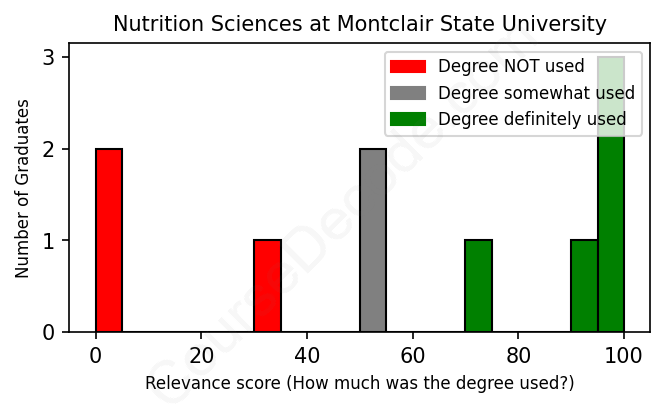
First, some facts. Of the Nutrition Sciences graduates from Montclair State University we've analyzed , here's how many have used (or NOT used) their degree in their career:

These are estimates based on AI analysis of 10 LinkedIn profiles (see below).
The verdict? Below average. Overall, with an average relevance score of 59%, Nutrition Sciences graduates from Montclair State University have a lower likelihood (-8%) of finding work in this field compared to the average graduate across all fields:
And for comparison, here's the chart for all profiles we've looked at across all degrees.
Also, after graduating, 40% of these graduates have pursued further education other than another Bachelor's degree (such as a Masters degree or other), compared to the average across all profiles of 35%. This suggests you may need more than just a Bachelors degree to be competitive as a Nutrition Sciences graduate.
See the details:
|
Relevance score: 73% We think this person has gone into a career highly relevant to their degree. We think this person has gone into a career highly relevant to their degree.
DEGREE INFOGraduated in 2016 from Montclair State University with a Bachelor of Science - BS in Nutrition Sciences. Also pursued further education since (see below). JOB HISTORY SINCE GRADUATIONNutritionist WIC Dec 2016 - Sep 2017 Registered Dietitian  Shoprite of Linden Jun 2019 - May 2020 Registered Dietitian  RWJBarnabas Health Aug 2020 - Aug 2021 Registered Dietitian  US Army Sep 2021 - Present FURTHER DEGREES DONE SINCE GRADUATINGMaster of Nutrition SciencesCollege of Saint Elizabeth 2018 - 2019 ABOUTNo information provided. |
The top 10 most common jobs done by the graduates we've analyzed (ranked most common to least) are:
From the data gathered on LinkedIn profiles of Montclair State University graduates in Nutrition Sciences, it seems like many of them transitioned into roles that are quite relevant to their degree. The most common positions they held include various internships, particularly as Dietetic Interns, and professional roles as Registered Dietitians or Nutritionists. These positions typically involve applying their knowledge of nutrition principles and practices in a clinical or community setting, which perfectly aligns with their educational background. Many graduates have also worked in educational roles or public health-focused jobs, making strong use of their nutrition expertise.
However, it's important to note that not every job held by these graduates is directly tied to their Nutrition Sciences degree. Some worked in roles like receptionists or even bartenders, where the knowledge of nutrition isn't a primary requirement. While these positions might use some general skills like communication or customer service, they don't offer much in terms of applying their specialized education. Overall, though a significant number of these graduates have found jobs that are highly relevant to Nutrition Sciences, there's still a mixed bag of experiences that strays from the core competencies of the field.
Here is a visual representation of the most common words in job titles for Nutrition Sciences graduates (this is across all Nutrition Sciences graduates we've analyzed, not just those who went to Montclair State University):

It looks like graduates from Montclair State University with a degree in Nutrition Sciences tend to have a pretty focused career trajectory, at least in the nutrition field. Many of them end up in roles that are directly relevant to their studies early on, especially through internships. Right after graduation, a lot of these folks start out as dietetic interns, nutrition educators, or public health educators, which gives them the hands-on experience they need in their field. For instance, a graduate from 2012 did multiple dietetic internships before landing a registered dietitian role, which is a common path for many. The initial positions often involve working with food banks, hospitals, or health organizations—places where they can apply their knowledge of nutrition and dietetics straight away.
Looking a bit further down the line—about five or ten years after graduation—you can see many of these individuals have moved into more stable and committed roles, such as registered dietitians or clinical nutritionists. Some have even branched out into different healthcare settings like hospitals or wellness organizations. However, it’s also clear that not every graduate sticks to the nutrition path; some have veered off into unrelated fields like bartending or general management in retail. Still, a significant portion continues to thrive in positions that align with their degree. Overall, while some graduates may stray into other careers, many find fulfilling jobs in the nutrition and health sector that reflect their education and interests.
Honestly, getting a Bachelor’s degree in Nutrition Sciences, whether at Montclair State University or elsewhere, can be a bit of a mixed bag. It’s not the absolute toughest degree out there, but it definitely has its challenges. You’ll dive into a lot of science courses, like biology and chemistry, which can push you if you’re not super comfortable with the hard sciences. Plus, there’s a fair amount of studying and coursework involved, especially since you’ll be learning about human health, food systems, and nutritional guidelines. However, if you have a genuine interest in nutrition and enjoy learning about how food impacts health, you'll probably find it pretty rewarding—and with some effort, it’s totally doable!
Most commonly, in the LinkedIn profiles we've looked at, it takes people 4 years to finish a Bachelor degree in Nutrition Sciences.
Looking at these Nutrition Sciences graduates from Montclair State University, it seems like they've had a bit of a rocky road when it comes to making decent money. Many of them started off with internships, which typically don't pay well (if at all), and even some early jobs like nutrition educators and public health roles likely brought in modest salaries. However, it does look like a few have found their footing as registered dietitians, which can offer a more stable and better-paying career. On the flip side, there's also someone who jumped into a bartending gig shortly after graduation, which might not exactly scream "big bucks" in the nutrition field. Overall, while some may be earning a decent living now, most of them probably had to grind through lower-paying positions before hitting their stride financially.
Here is a visual representation of the most common words seen in the "about" section of LinkedIn profiles who have a Bachelor degree in Nutrition Sciences (this is across all Nutrition Sciences graduates we've analyzed, not just those who went to Montclair State University). This may or may not be useful:

Here are all colleges offering a Bachelor degree in Nutrition Sciences (ordered by the average relevance score of their Nutrition Sciences graduates, best to worst) where we have analyzed at least 10 of their graduates:
| College | Score | Count |
|---|---|---|
 University of Connecticut University of Connecticut
|
85 | 11 |
 Penn State University Penn State University
|
76 | 13 |
 California Polytechnic State University-San Luis Obispo California Polytechnic State University-San Luis Obispo
|
75 | 12 |
 University of New Hampshire University of New Hampshire
|
71 | 10 |
 Arizona State University Arizona State University
|
70 | 12 |
 Texas A&M University Texas A&M University
|
70 | 19 |
 The University of Texas at Austin The University of Texas at Austin
|
60 | 21 |
 Montclair State University Montclair State University
|
59 | 10 |
 Kaplan University Kaplan University
|
54 | 12 |
 University of Arizona University of Arizona
|
46 | 20 |